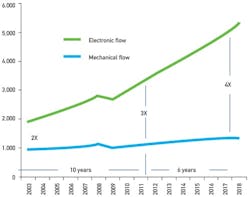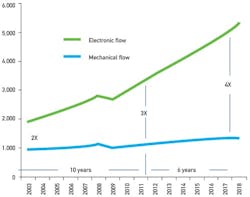New Honeywell Technology Promises Boost in Upstream Oil and Gas Production
Honeywell Process Solutions has released Digital Suites for Oil and Gas, a set of software and comprehensive services the company says can help oil and gas producers boost production performance by 3% to 5% while improving operational safety. The production improvements, which have been validated through customer testing, are driven by a combination of better productivity, higher uptime and more efficient remote operations, and can produce a return on investment in as little as six months.
"Upstream oil and gas producers tell us they have access to more real-time data than ever, but access to that data alone is not enough to improve performance,” said Ali Raza, vice president, Honeywell Process Solutions. “Digital Suites for Oil and Gas turns data into digital intelligence that helps operators make critical decisions faster. We worked closely with customers to better understand the unique needs of upstream oil and gas producers and to develop packages of technologies, called Digital Suites, which capture, manage and analyze the right production information to generate meaningful digital intelligence."
Digital Suites for Oil and Gas is a fully integrated offering, but each suite is also available separately, so customers can address the specific issues they face. The six suites are Operational Data, Process Safety, Production Surveillance, Equipment Effectiveness, Production Excellence and Operational Performance.
Digital Suites for Oil and Gas works seamlessly with Honeywell’s full line of integrated control and safety systems, instrumentation and industrial products, and can be easily integrated into multi-vendor environments.
In its 2014 Market Forecast, the Measurement, Control & Automation Association (MCAA) predicts that the displacement of mechanical flowmeters by electronic flowmeters has accelerated over the last 15 years such that the electronic flowmeter market, which was three times the mechanical market in 2012, is forecast to be four times its size by 2018. One could extrapolate that the differential would be five times in 3.6 years thereafter (2021), but the researchers believe that is unlikely because mechanical meters remain competitive in a number of applications—including custody transfer and fuel metering—and because of the inherently conservative nature of the marketplace, which tends to support the use of well-proven technologies such as mechanical level instrumentation.
About the Author
Control Global Staff
Control Global Staff

Leaders relevant to this article:

